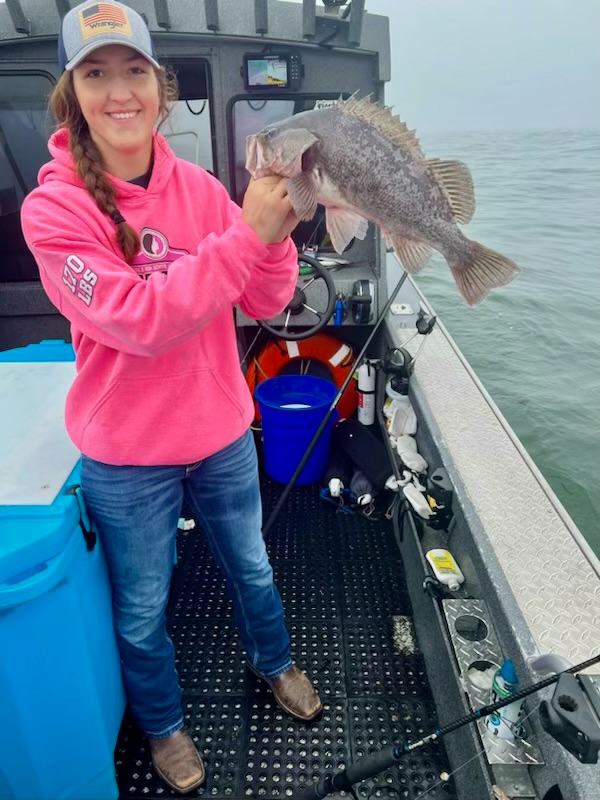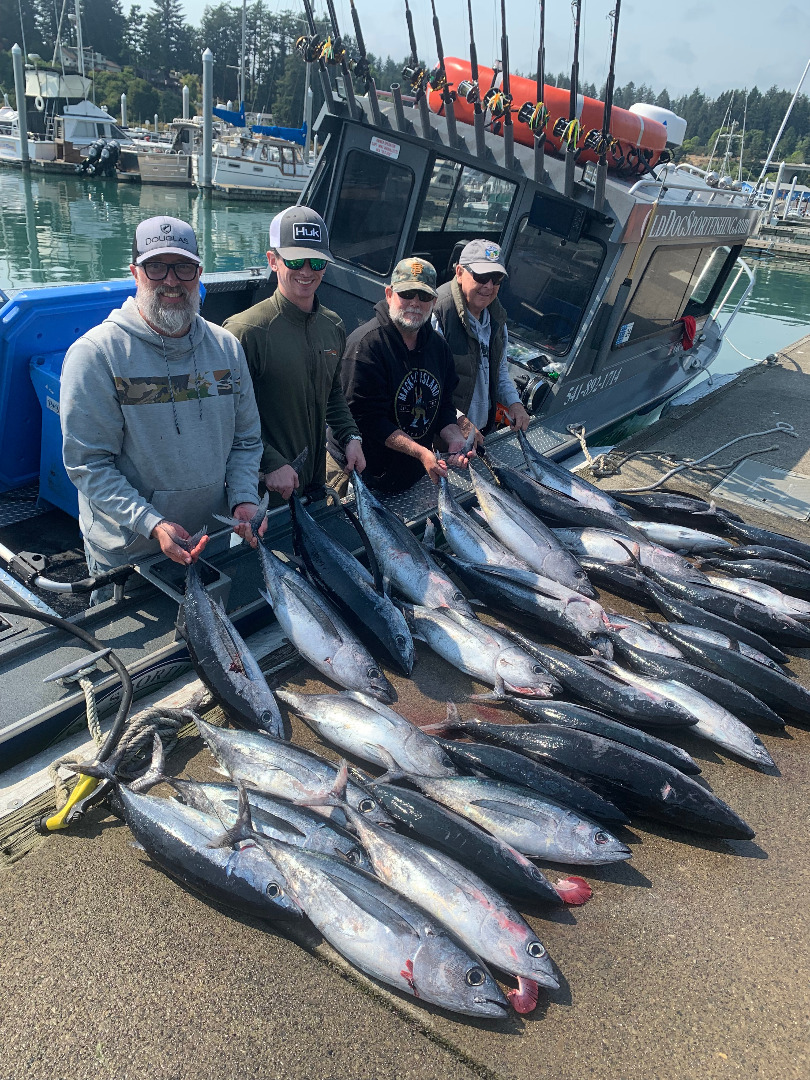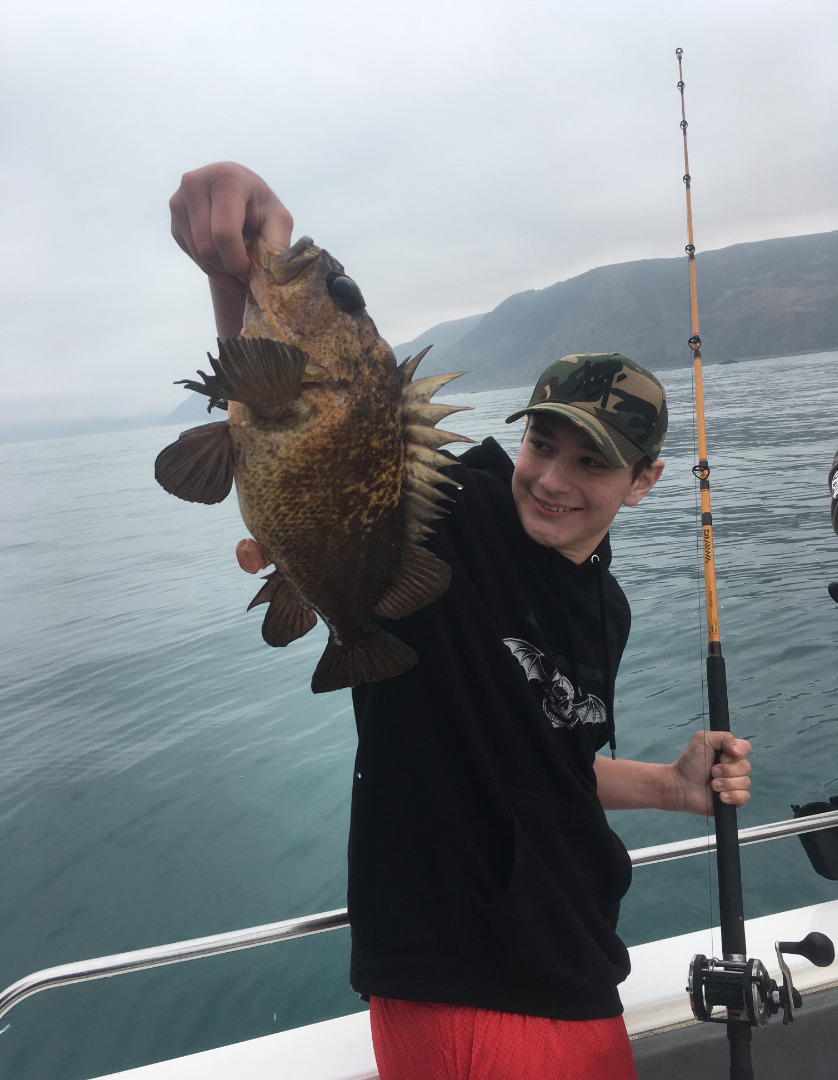Fish Report for 8-16-2023
Nearshore Rockfish Season Set to Close Aug. 21

by Kenny Priest
8-16-2023
Website
First ocean and river salmon, then Pacific halibut, and now in what feels like a knockout blow to our fishing community, CDFW has closed the nearshore rockfish season beginning Monday, Aug. 21 for boat-based anglers. In the Northern Groundfish Management Area (GMA), which runs between the CA/OR border and Cape Mendocino, anglers will only be allowed to fish seaward of 50 fathoms (300 feet). Anglers will be able to target lingcod and deepwater shelf and slope rockfish. Nearshore rockfish, cabezon, and greenlings cannot be targeted, taken or possessed. The reason for the shutdown is the reduced number of quillback rockfish. CDFW took in-season action and prohibited the retention of quillbacks starting Aug. 7. But clearly that wasn’t enough as the harvest limit, at least according to CDFW, has been exceeded in the Northern GMA.
CDFW anticipates that additional action may be needed for this and other GMAs for the remainder of 2023 and in 2024, in response to the most recent quillback rockfish stock assessment indicating the population is in severe decline.
Specific information for groundfish anglers within the Northern GMA:
- Changes described above do not apply to shore-based anglers or divers.
- The 50-fathom Rockfish Conservation Area boundary line is defined by straight lines connecting a set of waypoints as adopted in federal regulations (50 CFR Part 660, Subpart C).
- Fishing gear may not be deployed shoreward of the 50-fathom Rockfish Conservation Area boundary line when shelf rockfish, slope rockfish or lingcod are possessed on the vessel.
- Vessels may transit shoreward of the 50-fathom Rockfish Conservation Area boundary line with shelf rockfish, slope rockfish, or lingcod in possession if no fishing gear is deployed.
- Vessels fishing in the adjacent Mendocino GMA and transiting back to the Northern GMA must adhere to the ‘offshore-only’ provisions in effect in the Northern GMA, and may not return with nearshore rockfish, cabezon, and/or greenlings on board.
Some of the more widely-caught nearshore rockfish that are now off limits include: Blue, Black, China, Copper, Brown, Gopher, and Olive.
Some examples of Shelf rockfish include Bocaccio, Widow, Canary, Vermilion, and Chilipepper.
Common Slope rockfish include: Splitnose, Darkblotched, Bank, Aurora, Blackgill, and Sharpchin.
CDFW urges anglers to use best fishing practices to reduce impacts to quillback rockfish and other prohibited groundfish species. These include reducing mortality when releasing fish by utilizing a descending device and relocating to different fishing grounds or switching targets if quillback rockfish or other prohibited species are encountered.
For recreational groundfish regulations, visit wildlife.ca.gov/Fishing/Ocean/Regulations/Groundfish-Summary. You can read the official press release announcing the depth change here.
Weekend marine forecast
Northerly winds are expected to increase Wednesday afternoon and then remain steady through the weekend. Friday’s forecast is calling for north winds 5 to 15 knots and northwest waves 8 feet at nine seconds and west 3 feet at 13 seconds. Saturday is calling for similar winds and waves. Sunday’s forecast is better, with winds out of the north 5 to 10 knots and northwest waves 6 feet at nine seconds. These conditions can and will change by the weekend. For an up-to-date weather forecast, visit www.weather.gov/eureka/ or www.windy.com. You can also call the National Weather Service at 443-7062 or the office on Woodley Island at 443-6484.
California halibut bite remains steady
The California halibut bite has been consistent, with fish being caught daily. Anchovies are starting to show in the bay, and there seems to be plenty of shiner perch for those wanting live bait. Anglers fishing dead bait and even jigs and swimbaits are having plenty of success. The minimum size is 22 inches and the daily bag and possession limit is two.
Trinity River water release
Beginning Friday, Aug. 18, the Bureau of Reclamation will begin to increase flows to the Trinity River for the Hoopa Valley Tribe’s Ceremonial Boat Dance. Lewiston Dam releases are scheduled to gradually increase from the summer base flow of 450 cubic feet per second and are expected to reach a peak flow of 2,000 cfs on Aug. 20 before gradually returning to summer base flows later in the week.
River recreators can expect a higher volume of water and increased turbidity in the Trinity River during the ceremonial flow. As always, the public is urged to exercise caution when recreating in or around the Trinity River. For more info, visit www.usbr.gov/newsroom/news-release/4598
The Oceans:
Eureka
According to Tim Klassen of Reel Steel Sport Fishing, the rockfish bite at Cape Mendocino has been really good, with plenty of variety. “We made a couple trips down last week, and we’ll try and get a few more in before the closure,” said Klassen. “The tuna water is sitting roughly 36 miles out, but the weather looks marginal this week. There’s a chance you could sneak out a day this week to see what’s out there.”
Shelter Cove
“The weather finally laid down late last week and we were able to make it to Rodgers Break for rockfish,” said Jake Mitchell, of Sea Hawk Sport Fishing. “It was really good and we were even able to get our lingcod limits fairly easily a couple of days. Sunday and Monday we ran for albacore straight out 25 to 30 miles. Sunday, they didn’t seem to bite very good and we only ended up with six, but we quit a little early. Monday was a little better and we ended up with 28. Most boats had 15-25 fish.”
Crescent City
According to Britt Carson of Crescent City’s Englund Marine, it was another good weekend for California halibut anglers. “Boats did well trolling anchovies along south beach, with some limits reported,” said Carson. “There were also a few Threshers caught. The rockfish and lingcod bite are still really good when they can get out. Unfortunately, that will come to an end after Sunday.”
Brookings
Tuna has been decent out of Brookings on calm weather days reports Andy Martin of Brookings Fishing Charters. “The best fishing is to the north, off of Pistol River or Gold Beach,” said Martin, “Boats venturing uphill to the 125 line are getting 50 fish per boat. Straight out along the border, catches are much lighter. Windy weather likely will keep boats away from the tuna grounds this week. Halibut fishing remains good with a fish per rod in 180 to 250 feet of water. Lingcod and rockfish action has been fair to good. California halibut are biting in front of the harbor.”
The Rivers:
Lower Klamath
Steelhead fishing has slowed on the lower Klamath the last few days as the water temperatures have increased. It’s been best first thing in the morning and it gets tough when the sun comes out. We should see some improvement next week when the water arrives from the Trinity. Fishing pressure continues to be light. The daily bag limit is two hatchery steelhead or hatchery trout per day on both the Klamath and Trinity rivers, with a possession limit of four. Anglers must have a Steelhead Fishing Report and Restoration Card in their possession while fishing for steelhead trout in anadromous waters. For more information, visit nrm.dfg.ca.gov/FileHandler.ashx?DocumentID=202686&inline
Lower Rogue “The Rogue Bay remains solid for salmon, but expect a crowd,” said Martin. “With fishing slow on other systems, and closed to the south, the word has gotten out about the big salmon run in the Rogue. Anchovies fished behind 360 flashers are working best.”
Kenny Priest operates Fishing the North Coast, a fishing guide service out of Humboldt specializing in salmon and steelhead. Find it on Facebook, Instagram, YouTube and www.fishingthenorthcoast.com. For up-to-date fishing reports and North Coast river information, email kenny@fishingthenorthcoast.com.
< Previous Report Next Report >
< Previous Report Next Report >
More Reports

8-9-2023
One of the better Pacific halibut seasons came to a close last Friday, with boats catching limits right up until...... Read More

8-2-2023
The California Department of Fish and Wildlife projects the combined recreational and commercial take of quillback rockfish will exceed the...... Read More

Website Hosting and Design provided by TECK.net